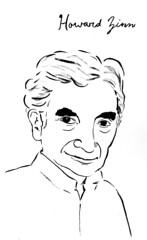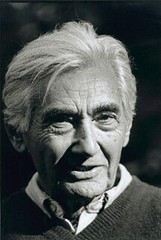“It would be better to have a society with newspapers and no government, than one with government and no newspapers.” – Thomas Jefferson.
 Robert McChesney and John Nichols are two people that have taught me alot about how the global media works and doesn’t work. Their writing has accompanied me throughout my journey as the independent and admittedly unorthodox type of journalist that I try to be. So when they talk, I take it seriously. Last week they were guests on Radio Open Source to talk about their vision of the future of journalism in a digital age. I’m now listening to this program for the third time, still trying to decide what they’re telling us and how I feel about that vision.
Robert McChesney and John Nichols are two people that have taught me alot about how the global media works and doesn’t work. Their writing has accompanied me throughout my journey as the independent and admittedly unorthodox type of journalist that I try to be. So when they talk, I take it seriously. Last week they were guests on Radio Open Source to talk about their vision of the future of journalism in a digital age. I’m now listening to this program for the third time, still trying to decide what they’re telling us and how I feel about that vision.
Ultimately I recommend anyone and everyone out there listen to the program so you get the details directly from them and not from me translating it the way I understand it. But I’ll just go over the part I like best and I feel its close to the “third way” of funding journalism in the future, that I’ve been looking for.
According to McChesney and Nichols, the idea is that a free press will not just happen naturally, if there is no funding for citizen and community media, the government should take steps to make sure it can exist and compete with commercial or any other media. To do so, they envision every citizen getting 200$ (in the US case) in federal money to put towards a non-profit non-commercial media outlet of their choosing, every year.
Thus if there’s a local radio station or newspaper doing work you appreciate and want to see continue, you put your annual money on them. Say you live in a place, a community where you wish there was some kind of community project, you could pool money amongst the people of the neighborhood and start a new non profit media center. In the case that you fund something one year and in that year it doesn’t do what you feel is a good job or ceases to produce anything of use, in the following year you can put your money somewhere else.
At first I thought this plan was an old plan that had been laid out and debunked long ago. But listening to it now, this might really be something. A chance to get around the profit motive that has choked out so much good reporting. It doesn’t mean there won’t be commercial media, those would continue to exist much in the way they do now. In fact McChesney points out that in the nations where the most money is given in subsidies to non-commercial media, the private sector is the most robust! Beyond that such a system would encourage philanthropists, including some people I know, to start new projects in non commercial media and gain support from the public.
Give the program a listen, after 3 listens I have finally recognized that this is not just the same old discussion about what will happen to media.. there are possible answers here.

 Robert McChesney and John Nichols are two people that have taught me alot about how the global media works and doesn’t work.
Robert McChesney and John Nichols are two people that have taught me alot about how the global media works and doesn’t work.  Howard
Howard  Anyone who has ever been to the United States, or watched commercials on American Television somehow, knows of the never-ending barrage of Pharmaceutical ads that have come to take over the gaps in between programming. They feature excessively clean and happy people walking through parks or high-fiving each other because some ailment they have has been cured by some brand name you should “ask your doctor about”. I can only imagine what its like to be a doctor in the United States today and have your patients coming up to you “asking about” a drug they saw on TV which they would like to have.
Anyone who has ever been to the United States, or watched commercials on American Television somehow, knows of the never-ending barrage of Pharmaceutical ads that have come to take over the gaps in between programming. They feature excessively clean and happy people walking through parks or high-fiving each other because some ailment they have has been cured by some brand name you should “ask your doctor about”. I can only imagine what its like to be a doctor in the United States today and have your patients coming up to you “asking about” a drug they saw on TV which they would like to have. Besides all the great ideas and the very talented and fun individuals taking part in this event, what I find most interesting is that whether it be through annual events or permanent creative spaces, this community feels more and more open and engaged with other communities in society. From science, to art, to politics, or history… the list of intersection and cooperation with the hacking community continues to grow. A development which I would describe as positive when compared to being an isolated, ignored, or intimidated group of thinkers.
Besides all the great ideas and the very talented and fun individuals taking part in this event, what I find most interesting is that whether it be through annual events or permanent creative spaces, this community feels more and more open and engaged with other communities in society. From science, to art, to politics, or history… the list of intersection and cooperation with the hacking community continues to grow. A development which I would describe as positive when compared to being an isolated, ignored, or intimidated group of thinkers.